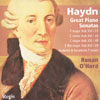Haydn Great Piano Sonatas
Haydn-playing that just fails to penetrate beyond the music’s surface
View record and artist detailsRecord and Artist Details
Composer or Director: Joseph Haydn
Genre:
Instrumental
Label: Regis
Magazine Review Date: 4/2010
Media Format: CD or Download
Media Runtime: 72
Mastering:
Stereo
DDD
Catalogue Number: RRC1311

Tracks:
| Composition | Artist Credit |
|---|---|
| Sonata for Keyboard No. 38 |
Joseph Haydn, Composer
Joseph Haydn, Composer Ronan O'Hora, Piano |
| Sonata for Keyboard No. 33 |
Joseph Haydn, Composer
Joseph Haydn, Composer Ronan O'Hora, Piano |
| Sonata for Keyboard No. 58 |
Joseph Haydn, Composer
Joseph Haydn, Composer Ronan O'Hora, Piano |
| Andante with Variations |
Joseph Haydn, Composer
Joseph Haydn, Composer Ronan O'Hora, Piano |
| Sonata for Keyboard No. 43 |
Joseph Haydn, Composer
Joseph Haydn, Composer Ronan O'Hora, Piano |
Author: Nalen Anthoni
O’Hora does. He only hints and suggests. Much of the wonder of incident in this sonata passes him by, as it does in the other sonatas, though he responds positively to the contrasts inherent in the first movement of No 58. Otherwise there is a reluctance to grapple with knotty matters that pays poor dividends in the F minor Variations, HobXVII/6. O’Hora senses its melancholy but negates the effect by an emotional reserve that spills into the angry coda as well. Angela Hewitt and Staier are intensely concentrated in their different ways, Staier even playing the five-bar bridge passage before the return of the theme that O’Hora and Hewitt (and many others) inexplicably omit.
Discover the world's largest classical music catalogue with Presto Music.

Gramophone Digital Club
- Digital Edition
- Digital Archive
- Reviews Database
- Full website access
From £8.75 / month
Subscribe
Gramophone Full Club
- Print Edition
- Digital Edition
- Digital Archive
- Reviews Database
- Full website access
From £11.00 / month
Subscribe
If you are a library, university or other organisation that would be interested in an institutional subscription to Gramophone please click here for further information.




